Inspection Disclosures
We disclose inspection results online through our ChooseWise website or by reporting them directly on our Inspections and Enforcement Results pages. Some inspected premises, like food premises, personal service settings, recreational water facilities, and recreation camps are also required to display inspection results on-site.
What we do
Some of Northwestern Health Unit’s (NWHU) services related to inspection disclosures include:
- ChooseWise
- Tobacco and vapour product vendors
- Disclosing Infection Prevention and Control Lapses
- On-site public health inspections: Disclosures
- On-site Food Premises and Personal Service Settings signs
- On-site Recreational Water Facilities and Recreational Camps signs
ChooseWise
ChooseWise is our online disclosure system. Having inspections publicly disclosed helps operators with more incentive to follow the regulations set out for their type of premises, but also helps the consumer to make informed choices.
If you are concerned about the condition of a premise, or the practices of a premise, you can also lodge a complaint through our ChooseWise website. A public health inspector will follow up with the operator.
Food premises
We disclose inspection results for food premises through our ChooseWise website and on-site. The frequency of inspections for food premises depends on the type of food premises; a public health inspector inspects low-risk premises once a year, while we inspect high-risk premises three times in a year.
Personal service settings
Personal Service Settings (PSSs) are businesses that provide services like manicures, pedicures, nail treatments, waxing, facials, hair design, tattoos, piercings, acupuncture, tanning beds, micro pigmentation, electrolysis and laser hair removal.
Northwestern Health Unit (NWHU) inspects PSSs annually, reviews records, and checks equipment infection control measures. Inspections are intended to educate operators, identify potential risks to customers, and confirm that infection control measures are appropriate to protect customers at the time of inspection. PSSs must comply with O. Reg. 136/18: PERSONAL SERVICE SETTINGS.
Operators disclose inspection results on-site, and we also disclose them on our ChooseWise website.
Tanning beds
NWHU inspects businesses with tanning beds under the Skin Cancer Prevention Act, S.O. 2013.
The Skin Cancer Prevention Act works to protect young people from skin cancer by banning the use of tanning beds by youth under the age of 18. Operators are required to ask for proof of age and cannot promote tanning services to youth under 18.
Operators disclose inspection results on-site, and we also disclose them on our ChooseWise website. You can also lodge a complaint about a PSS through our ChooseWise website or by contacting us.
Tobacco and vapour product vendors
NWHU ensures vendors of tobacco and vapour products are complying with regulations set out in the Smoke-Free Ontario Act and Electronic Cigarettes Act (SFOA) as well as workplaces and other public places including schools.
Retail outlets and business owners must ensure their staff are educated on the laws for selling tobacco and vapour products. We disclose any retailer or business that is convicted of an offence under the SFOA on our Tobacco and Vapour Product Sale Offences page or by using the tool below.
Disclosing Infection Prevention and Control Lapses
We disclose lapses in infection prevention and control (IPAC) practices in inspected premises on our Infection Prevention and Control Lapse page, which you can access using our Infection Prevention and Control Lapse Disclosure page or by using the tool below.
Public health inspections: Disclosures
NWHU has implemented an on-site disclosure system for operators of food premises, personal service settings, recreational camps, and recreational water facilities. In addition to online disclosure through our ChooseWise website, inspected premises must publicly display signs that indicate how well they follow the regulations that help protect their consumers from infection and foodborne illness.
During an inspection, the health inspector will input infractions they observe into an electronic database. At the end of the inspection, a score is calculated based on the number of non-critical, critical, and health hazard infractions that were identified. Scores begin at 100 and points are deducted based on the type of infractions entered.
Inspection scores, results, and disclosure signs
| Pass: 75-100 points | Operators will receive a pre-printed green sign. The sign must be posted until the next regular inspection. |
| Conditional Pass: 1-74 points | Operators will receive a pre-printed yellow sign. The sign must be posted until a re-inspection can occur. |
| Closure: 0 points | Operators will receive a pre-printed red sign. The premises must be closed until an inspector is satisfied that the health hazard has been eliminated. |
Food Premises and Personal Service Settings signs
The operator will be given a sign to display in a visible location at all public entrances. The type of sign displayed depends on how well they scored during the inspection. They might receive a Green “Pass”, a Yellow “Conditional Pass”, or a Red “Closure” sign.
The logo changes depending on the type of premises, but the colours are the same.
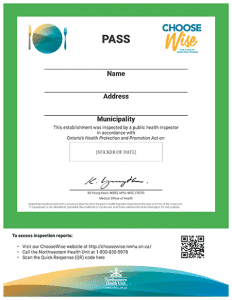
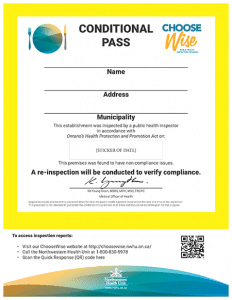
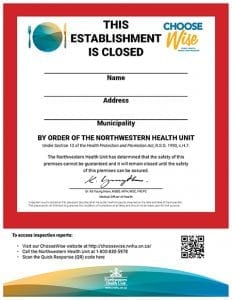
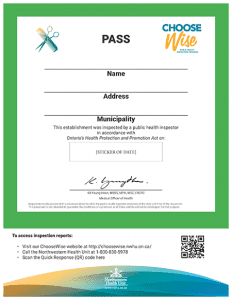
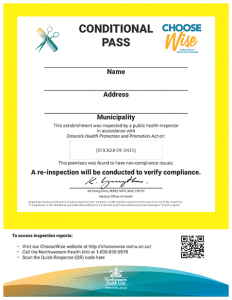
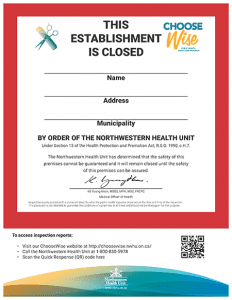
Recreational Water Facilities and Recreational Camps signs
Disclosure signs for recreational water facilities & recreational camps must be publicly displayed at all public entrances. These premises are given either a Green “Pass” or a Red “Closure” sign. If a green sign is displayed, the operator is following the requirements of the regulations, although there is a little bit of room for minor infractions. If a red sign is posted, the safety of the premises cannot be guaranteed and must be closed until safety can be assured.
The logo changes depending on the type of premises, but the colours are the same.
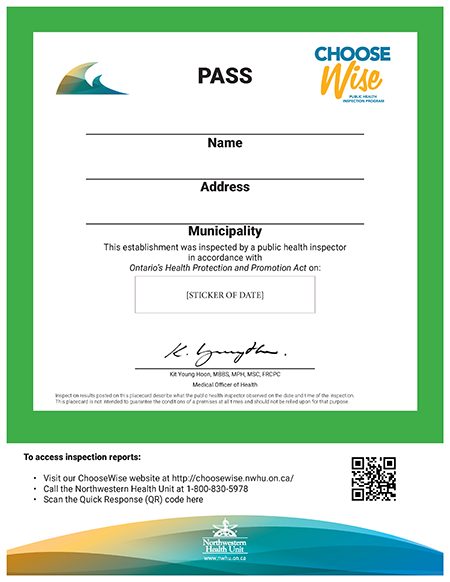
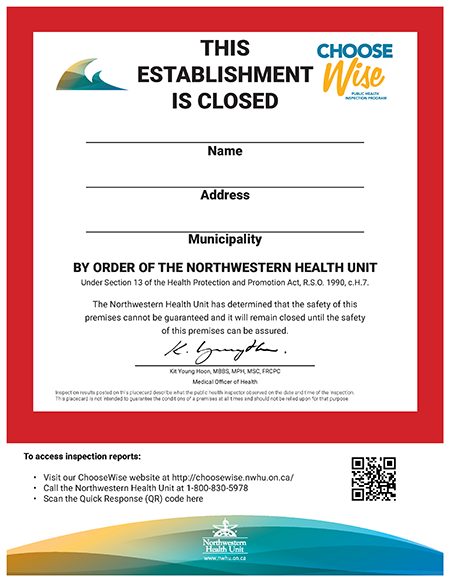
Inspection, disclosure, and enforcement results
Use the following to select a type of disclosure type to view its results:
Beach Water Sample Results and Closures
Infection Prevention and Control Lapse Disclosures
Tobacco and Vapour Product Sale Offences